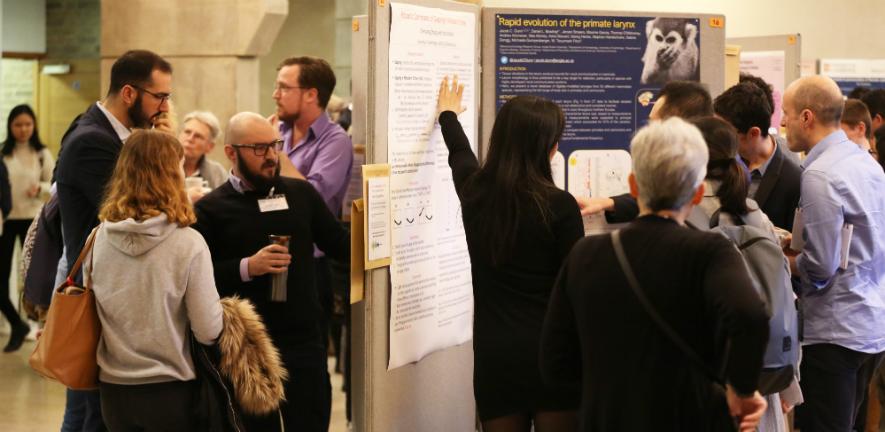
Submitted by Jane Durkin on Tue, 10/12/2019 - 13:02
The Cambridge Language Sciences Annual Symposium is an annual meeting of minds, giving members of the Cambridge Language Sciences research community the opportunity to meet for an afternoon of talks, poster presentations and informal networking.
This year’s Annual Symposium on Language Change took place on 19 November at Cripp’s Court, Magdelene College. It was a truly interdisciplinary affair with over 150 colleagues in attendance from a range of subjects across the Schools of Arts & Humanities, Humanities & Social Sciences, Technology and Clinical Medicine. We were also delighted to welcome delegates from Cambridge Assessment, Cambridge University Press, Cambridge Enterprise, the Strategic Partnerships Office as well as visiting scholars from other universities including Anglia Ruskin, Essex, Middlesex, Queen Mary, Oxford and Copenhagen.
The programme included talks on how migrants retain their mother tongue, computational approaches to historical linguistics, language variation, and the use of artificial languages to model language evolution, with presentations by Professor Monika S. Schmid (University of Essex), Dr Marieke Meelen (Theoretical & Applied Linguistics, Cambridge), Dr Christian Bentz (University of Tübingen) and Professor Kenny Smith (University of Edinburgh).
As in previous years, early-careers researchers showcased their work across a range of Language Sciences related topics in the poster slam and exhibition. In the poster slam – which has fast become a highlight of the event – poster presenters had one minute and one slide to tell the audience about their poster and pique their interest. This was followed by the poster exhibition, which gave delegates an opportunity to mingle and provoked much lively discussion.
This year for the first time the poster prize was put to an audience vote. Congratulations to the three winning posters who each received a £50 book voucher courtesy of Cambridge University Press:
- A holistic measure of sociolinguistic experience: contextual and individual linguistic diversity in South Africa and the United Kingdom (Mandy Wigdorowitz, Ana Pérez, and Ianthi Tsimpli)
- An assessment of the knowledge, attitudes, and practices of slum-dwelling mothers pre- and post- ‘SODOTO’ model of intervention in the Kolkata Mobile Teaching Kitchen (MTK) project (Sento Kai Kargbo, Luke Buckner, Minha Rajput-Ray, Maria Korre, and Sumantra Ray - supported by Cambridge Language Sciences Incubator Fund)
- Can you hear what’s coming? An ERP study of phonological prediction (Victoria Poulton and Mante S. Nieuwland)
The presentations and the poster slam were recorded and are available to watch in the Cambridge Language Sciences video & audio collection along with videos from other Language Sciences events.
- Change and stability in the native language of migrants (Professor Monika S. Schmid)
- Darling, dukeling, duckling: how historical corpora can verify predicted pathways of language change (Dr Marieke Meelen)
- Language change as a (random?) walk in entropy space (Dr Christian Bentz)
- The acquisition and evolution of linguistic variation (Professor Kenny Smith)
- Poster slam 2019
Finally we would like to thank everyone who contributed to make this such a successful event, in particular the speakers, Dr Laura Wright and Professor Paula Buttery for chairing, the poster presenters, Joyce Lim and James Algie for organising the poster slam and exhibition, and the researchers who reviewed the poster submissions. Thanks also to Cambridge University Press for sponsoring the drinks reception and the poster competition.
Cambridge Language Sciences currently runs two Symposia a year: an Annual Symposium in November for all members of our research community, and a Symposium for Early Career Researchers in the summer. Topics previously covered in the Cambridge Language Annual Symposium include:
2018: Language Sciences and Health (13 November 2018)
- Language acquisition, neural entrainment, phonology and dyslexia (Prof. Usha Goswami, Centre for Neuroscience and Education, University of Cambridge)
- Health crises, digital media and community voices: utilising interactive radio for rapid social research to improve outbreak preparedness and response (Dr Claudia Abreu Lopes, Africa's Voices Foundation)
- Using NLP and heterogenous user generated content to sense mental well-being (Dr Maria Liakata, Dept. of Computer Science, University of Warwick)
- The effect of early language and communication environment on social outcomes for primary school aged children with language difficulties (Dr Jenny Gibson, Faculty of Education)
- Stability and change in child language (Prof. Courtenay Norbury, Literacy Language and Communication Lab, University College London)
2017: Language Sciences and Tech Innovation (27 November 2017)
- The Use of Deep Learning in Spoken Dialogue Systems (Professor Steve Young, Dept. of Engineering / Siri Development Team)
- Individualised Language in the Big Data Era (Dr Paula Buttery, Dept. of Computer Science & Technology)
- Using Social Media to Investigate Linguistic Variation and Change (Dr David Willis, Theoretical & Applied Linguistics)
- Linguistic Yardsticks: Evaluating Language Technology Using Insightsfrom Linguistic Theory (Dr Laura Rimell, DeepMind)
- Powered by Cambridge: Devices, Data and interDisciplinarity (Saul Nassé, CEO Cambridge Assessment, English)
2016: Exploring the Borders of Language and Science (17 November 2016)
- Language dynamics: a neurocognitive approach to incremental interpretation (Professor Lorraine Tyler, Dept. of Psychology)
- Natural Language Processing and online health reports (or OMG U got flu?) (Dr Nigel Collier & Dr Anna Korhonen, Dept. of Theoretical & Applied Linguistics)
- Does natural language understanding have anything to do with understanding natural language? (Professor Ann Copestake, Computer Laboratory)
- A molecular genetic perspective on speech and language (Professor Simon Fisher, Max Planck Institute for Psycholinguistics, Nijmegen
2015: Inaugural Language Sciences Annual Symposium (12 November 2015)
- Statistical acoustic-phonetic historical linguistics: An introduction (Professor John Aston, Dept. of Pure Mathematics & Mathematical Statistics & Professor John Coleman, University of Oxford Phonetics Laboratory)
- Sunnyside (Dr Laura Wright, Faculty of English)
- Crowdsourcing big data in English dialectology (Dr Bert Vaux, Theoretical & Applied Linguistics)
- Understanding generative learning in the individual brain (Professor Zoe Kourtzi, Dept. of Psychology)
- Turn-taking, language processing and the evolution of language (Professor Stephen Levinson, Max Planck Institute for Psycholinguistics, Nijmegen)
PHOTO CREDITS: Chris Loades
